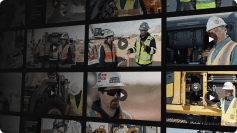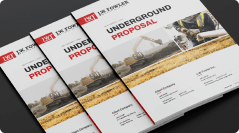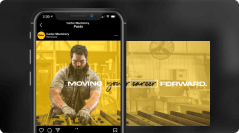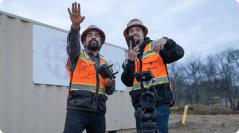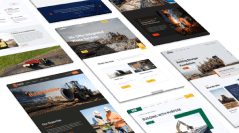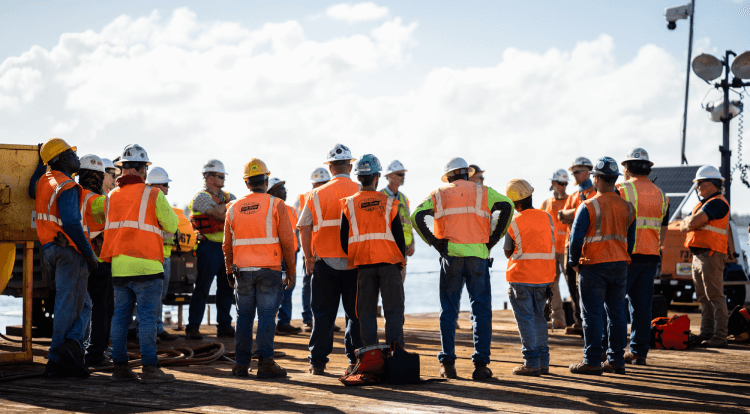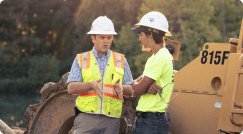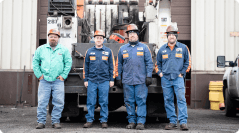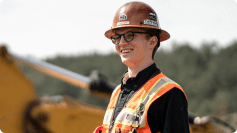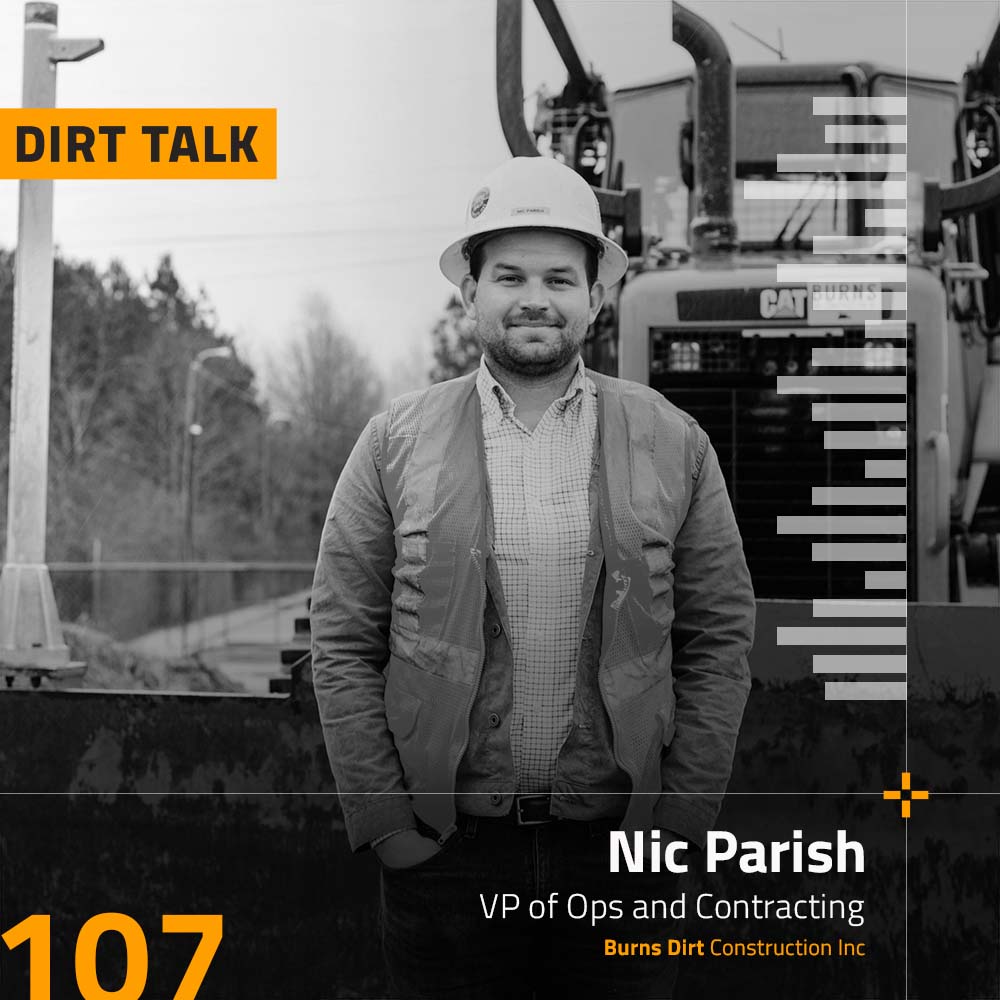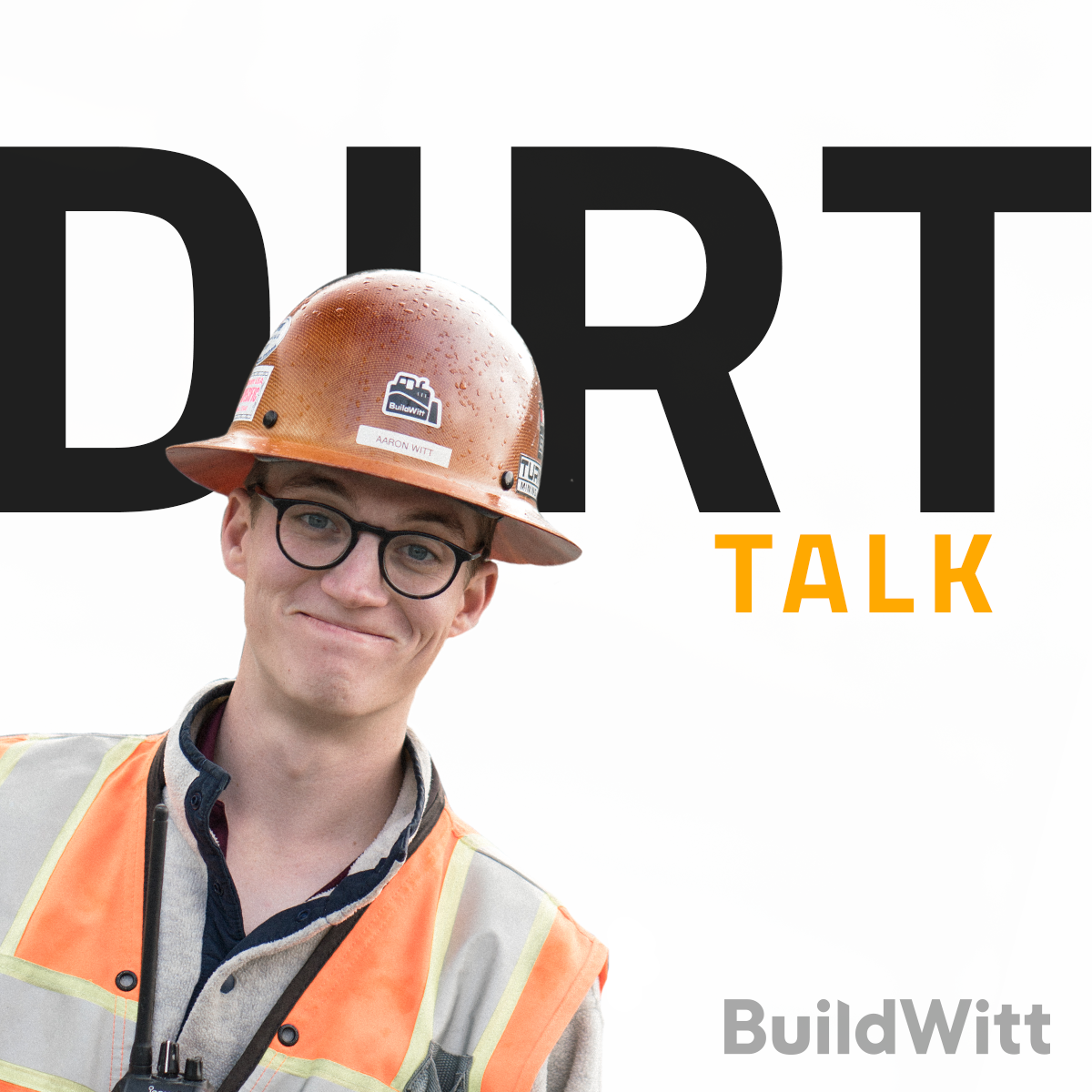FREE Ariat boots with every Ariat Dirt World Summit pass purchased | Ends in August 31.
Subscribe to Aaron’s Newsletter
Aaron’s raw thoughts and latest updates on business, travels, and his perspective on the Dirt World, delivered straight to your inbox.
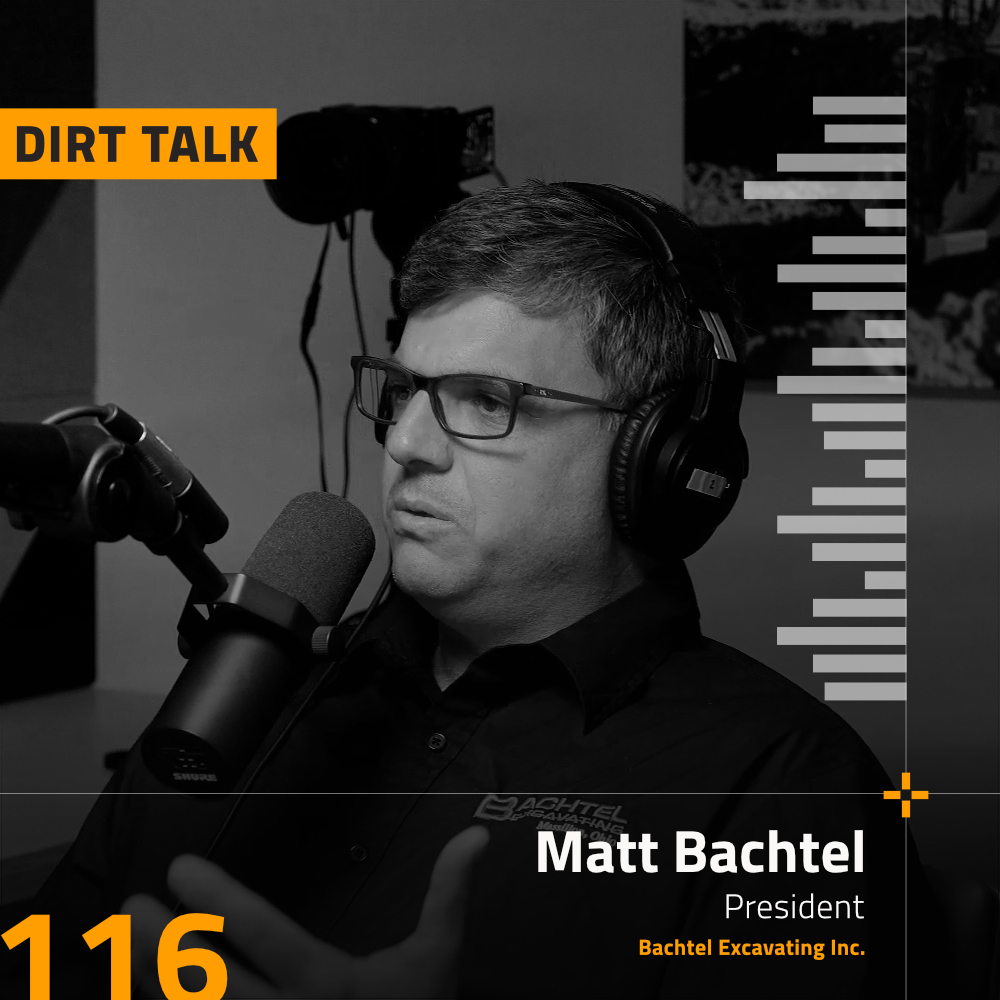
Episode 116
Building Slow and Steady with Matt Bachtel
April 21, 2022 • 68 minTranscript
Aaron:
So you do excavating in Ohio?
Matt:
That's correct.
Aaron:
When did you start excavating in Ohio? When did you start excavating? Take us all the way back.
Matt:
All the way back. I was probably like a lot of the guys that are in this industry, I was the five year old that enjoyed the trucks and everything. I was fortunate, my dad worked for a private water utility, so he was out of on a crews working and occasionally I'd get to go along to work and whatnot, and then...
Aaron
Like backhoes and that stuff?
Matt:
Backhoes that thing, fixing water main breaks, making water taps. So I was a kid that if like a backhoe showed up in the neighborhood, the other kids would go look at it for five minutes and I would stay all day. So, I had that background, but my dad, as he progressed in his career, became a manager at the water department. And I would go out on main breaks. I would go out and just ride with him in the summer and I would show up on jobs and I kept saying, "I want to do this. I want to do this." And he's like, "No, you need to go to college. You need to do that."
Aaron:
That's a very thankless job, because water mains don't break during business hours, they break whenever they want to break. And that's middle of the night, that's weekends, that's Christmas. And then when they break, it's not like, "We'll get around to it Monday." You need to go fix it pretty quick or else there's consequences. And so that's a tough gig.
Matt:
And I guess that being said, I was the kid that, he'd get a call at midnight, "Hey, I got to go out with the crew." I'd say, "Hey, can I ride along?" That's where I learned to drink coffee cuss, do all the fun stuff. And so I went on a job with him, it was one Saturday. He was checking on a contractor and I'm 15 years old. And guy's like, "What are you doing with yourself?" And I was like, "Ah, I got a little lawn business. I'm mow lawns. And my dad said, "Yeah, he wants to be an excavator." And the guy was like, "No way, you need to go to college. You need to go to college."
Matt:
And I ended up to say, "Man, I'd really like to try to go to". "Will you come with me for a day and I'll show you what it's about?" And I was hooked. I went out with them for a day and I didn't have the best first day. In the first hour or two, we were setting a manhole, the big casting and we were standing next to it. And he said, "Okay, I'm going to count the three and we're going to drop this thing." And when he dropped it, I pulled my fingers out too slow and I actually degloved all four of these fingers. So that was 15 years old. And that was the first day on the job.
Aaron:
That is brutal.
Matt:
And I was hooked. I went, got stitched up. They wouldn't let me work for a couple weeks. And I went right back and I was fortunate. Him and his father, they were a father, son team. The father had worked for a large highway contractor and they just knew how to do things right and they were patient, but they were hard working. And I just learned from those guys. And then the next summer I was getting ready to go to Ohio State to begin my college career and needed to pay for college and went back to those guys. And they said, "Hey, we don't have enough to keep you busy." So I called another excavating contractor and they hired me, but they didn't realize that even though I said that I'd worked for another excavator, they didn't really understand that I actually had a little bit of experience.
Matt:
So they put me in the shop and it was the best thing. Their shop really needed to be organized. And I'm a neat freak. I enjoy organizing things. So I went through and I sold like five dumpsters full of trash, a couple scrap dumpsters, I learned how to run a Bobcat, an excavator, a wheel loader, their shop floor was never cleaner. I organized their tool cage and I was just fortunate at Ohio State we were on quarters, so we went back later than everybody. The other college kid went back to school and I ended up going out on a crew and working for him for the final month, month and a half of the season. And I was able to earn the respect of a foreman and whatnot. And I got to lay water main, I got to be on a grading crew, just getting a little taste of everything. And I did that two more summers to pay for college.
Aaron:
You can tell a lot about a shop or a company, just company culture in general, by walking into a shop and just looking around it, it doesn't take you very long to look around and you learn so much. And even just how clean the floor is. And not even how tidy things are, but even just how clean the floor is, it makes a big difference. There's people that are, "Oh, it's a shop. Of course it's going to get disgusting," but I've seen a lot of shops that are completely spotless all the time. It's a pretty painted floor, shiny floor and they have mining equipment in there. It's amazing.
Matt:
It looks like a NASCAR shop. It's in construction.
Aaron:
Why do you think your dad was so adamant about you going to college and not being in the industry?
Matt:
I think it was what was just occurring in that era. My grandparents were Depression-era people. My dad had an associate's degree in civil engineering that he worked for at night. And I think that my mom, she started out as a beautician and then she became a reorder. So they went from being middle class to working themselves to upper middle class and it was the thing to do. You encourage your kids to go to college, get the degree. So, I'm in college, I'm studying business and marketing. I'm paying for it, doing excavating, learning the trade. And I had this amazing marketing professor my sophomore year that said, "Hey, if you want something in life, you got to go out and get after it." So this is like 1996. Internships were popular or just starting to take off.
Matt:
They're not as formal as that. So I wrote letters to every dealer in Columbus. Cat, John Deere, Komatsu, Bobcat, everybody and I was fortunate. I got four responses back and four interviews. And ultimately I interviewed with, now it's Murphy Tractor, but a John Deere dealer in Columbus. And they said, "Hey, we have no formal internship program. But if you're willing to come in and work in parts and service to improve yourself within time, you'll become a salesman for us." So I thought this was the perfect job. I love excavating, but everybody in my world tell me, "Hey, you should really get a degree and do something more white collar than blue collar." So, I thought it was the perfect compromise. So ended up working for the John Deere dealer. And it was an amazing experience.
Aaron:
What'd your dad think about you still going into the industry?
Matt:
It bonded us actually. So even though he is encouraging college, I was always close to my mom. If I had girl troubles or whatever, I'm calling my mom and talking about it but my dad and I needed something like that. It became a neat tool because we'd talk shop and then it would lead to the real world stuff, they encouraged me. They knew I enjoyed working hard and I enjoyed making money. I had a lawn business in high school. I had buddies working for me in that. They encouraged me and they said, "Just please get through and get the paper. We don't care what you do. We just like you to have the degree." So I worked for the John Deere dealer. It was awesome.
Matt:
I worked in service, sweeping the floors, just helping the guys, I was parts runner, but in that position, I got to go at all the excavating companies in Columbus. So Kokosing's one of the biggest highway contractors in Ohio, just an awesome company. I get to go put filters away in their three football field shop. So I learned how a shop should be laid out. It was an incredible experience. So did that for, I don't know, a year or so. As I approaching my senior year, they said, "Hey, we'd like you to be a salesman, but you got to prove yourself, you're going to be an intern. "So they gave me the customer list and it was back those old printouts where it had the tabs on it and they gave me this big pack and they said, "Nobody's looked at our customer list in yours, will you go through it and call every single person to see if they're dead or alive? Basically."
Matt:
So I learned how to call people, which is a very difficult thing to do for a lot of people. So I learned how to do that, I cleaned up their customer list and I rated people by number of pieces. I was asking questions, "How many pieces of equipment do you have? Why haven't you bought John Deere equipment and why?" That thing. So I proved myself. So my final quarter at Ohio state, they said, "Hey, we want you to be our small implement salesman. I hadn't even graduated, I got a company truck, a trailer, and I drag around skid steers and I had about five counties that I covered. So I was finishing school full time and earned a position with them.
Aaron:
It's amazing what a little initiative gets you. And that's the amazing thing about the Dirt World and what I tell kids is, "If you're not working in your summers, especially in college, what the hell are you doing?" That's the best possible combination. If you want to go get a degree, get a degree, but don't rule out, working in the field, go work in the field simultaneously, or go work in a shop or go do whatever you can at the bottom, in those summers. And then upon graduation, you're teed up to go do whatever the hell you want to do. You'll still go get the company truck. You'll get a damn good salary. You're going to be in a pretty good position.
Matt:
I have college aged kids that may or may not want to be in the business, but I said, "You need internships. That is your key." And I said that, "College is the only time that you can jump around. Not the only time, but it's a time where you can move around and it doesn't look bad on your resume."
Aaron:
You probably don't have a mortgage, you probably don't have kids you're supporting, there's really no downsides to hopping around as much. And that's why my plan was, every year a different company, because I could. That was just my model. And then, I was out of a company that closed its doors and everybody else was out of a job and it scared shit list or pissed or whatever it was. And I was over there like, "Well, I was going to be out of here in August anyway, so I'll just go get a job elsewhere." In construction too, one of the first things you have to figure out is what part of construction you want to get into. "Okay, great construction." That's a huge world. So go work for a GC one summer, go work for a heavy civil contractor next summer, maybe residential's exciting.
Aaron:
Go work for a residential contractor, go work for an electrical sub, go work for an engineering firm, go work for a DOT go, try out a bunch of different stuff, not do all that. Because if you do all that good for you, but go try different things out. I see people, the loyalty it's like, "Okay. I guess it gets you somewhere." And maybe you're just in with a really great company and there's no reason to leave, but I encourage everybody to hop around as much as you can.
Matt:
And even back to when I was working for excavators to work for a father and son, and then to work for a 25 person company. And then I also worked for a six person company. So I saw different aspects — the good, the bad, but that experience allowed me to build my business today.
Aaron:
And that's a great point. I knew, "Okay. Dirt, excavation, civil, that is my cup of tea," but I went to three different size companies. I did, the small local, the medium, and then the big multi-billion dollar international companies. And it's a totally different perspective at each on the same problem, essentially. So you're humming along at Deere?
Matt:
Correct.
Aaron:
And then where does the excavation company come into the picture?
Matt:
So I'm living in Columbus. I'm married and thinking about having a family. I'm enjoying the job, but I'm feeling that there's a compromise there. It was a compromise, it was balancing that marketing business degree with construction.
Aaron:
So compromise as in it wasn't all in the direction you wanted to be going in?
Matt:
Yeah. I think that I was maybe doing it because that was what I was supposed to be doing or that's how you use that. I paid for college, now I got to use it the way it's supposed to be. And we're at a crossroads. My wife and I, we're very conservative people. I'm an entrepreneur, that'll take risks, but I don't take risks like some of your other guests that have been on here, I listen to everybody. So I'm doing it in maybe a smaller box or window than most, but we had bought a house in Columbus. It was a dump. I worked every night and every weekend renovating to myself, I had to rent a mini excavator to waterproof the foundation. And I did my own landscaping and we get done and it's exactly what we want.
Matt:
And we're like, "We need to move back." We were both from Massillon, Ohio, so we needed to move back. But that renovation gave us the confidence of, "Oh, we managed a project, it kept it on budget and it moved forward. And we were fortunate that we had bought the smallest worst house on the street and the houses across the street from us were double the size. And we were on an acre lot in Columbus, in a very good neighborhood. So we abruptly said, "Hey, let's move back." And I said, "Well, if we're going to move back, what am I going to do for a job?" And I'd always wanted to start a business. And with my wife's support, she said, "No time's better than this." So we sold this house after having it for one year, we're fortunate enough to turn a profit on it.
Matt:
And we took a third of it, put it as a down payment on an excavator, and a third on a down payment on a house in our hometown. And a third of it was our small, small cash to get the business started. So that was it. We moved back to Massillon in 2000 and my last sale at the John Deere dealer was a John Deere, 50 mini excavator, and a trailer. And I found a used one ton dump truck in Columbus and purchased that and moved back in May of 2000.
Aaron:
How did you get your first job?
Matt:
I was very fortunate. So the one thing, Columbus is high growth. Nashville's high growth, Massillon, Ohio is not high growth. It's an hour south of Cleveland, two hours north of Columbus.
Aaron:
How many people are there?
Matt:
35,000. Nextdoor is Kent, Ohio pro football hall of fame, Akron's 20 minutes north there. So it's not that it's this rural community by any means, but it's not high growth. Went through a lot of hard times with the steel industry, leaving Northeast Ohio, Rust Belt, all these things. But the beauty of Massillon is a community. My grandmothers both just passed away last year. One was 101 and one was 93.
Aaron:
Wow.
Matt:
So the family's there. My dad was a respected person in the community and the construction industry, my mom's a reorder who's respected. So there was a name there. My uncle built houses and my aunt was the office manager. And they believed in me even when they shouldn't have. So they took me to their association meetings and said, "Hey, my nephew's in the business, give them a shot."
Matt:
And then the building industry association, I signed up for that and really just to get their mailing list. So that Ohio state marketing degree, probably, I can't say I use it a whole lot, but I knew enough to make a flyer. And I sent it to every builder in the building industry association. And I said, "I'm going to do utility work for new construction houses." But I didn't even own a Bobcat, but I listed Bobcat services as well. I knew because of the sales background that I could rent anything I needed. I was in the know of how to maneuver and build without actually taking on a lot of debt.
Aaron:
To start a construction company, you don't even need all that much capital. You don't necessarily need to go buy a machine. And it depends on what work you get, because sure, maybe you don't get paid for 90 days or whatever it is. If you have materials or rental costs or whatever it is, you have to float that, but you can go rent the equipment and so you can go land a job. You can probably negotiate some money up front, go rent the equipment and have at it. And it's not as simple as that, but you can cross your fingers and try to make it work.
Matt:
To start a business. You have to be naive.
Aaron:
Exactly.
Matt:
You have to be naive.
Aaron:
100%.
Matt:
So I was fortunate. I got good advice, "Get a good accountant, get a good lawyer." And this is before I even bought the equipment. And I sat down with the account and he said, "What do you project?" I had a business plan on how to acquire work, what I wanted to purchase, which markets I was in. Even though I had had finance and econ and accounting at Ohio state, I really did not understand cash flow. I knew what a P&L was or a balance sheet, but I did not have a clue. So he was like, "How much?" And I hadn't really calculated it. So, I took on whatever that would've been 60 or $80,000 in debt. And I think I will bill $188,000 the first year from May to...
Aaron:
Pretty damn good.
Matt:
It was good. And then, 22 years ago, that was a little more. You need that, but you really need support too. So, my wife, she was working, she had the health insurance, those things that give you the foundation. You really need to think about that. You need that support.
Aaron:
And I think the support's the bigger side of it. I think, "Okay, great. You need capital." But I think the support, especially if you don't necessarily know how to run a company, all that well, and do this work, or at least like with my little fake grading operation.
Aaron:
I run into problems all the time and I have to reach out to people because it's like, "Dude, I have no idea how to fix this or do that or clean this up or anything like that." Or, "Hey, is this going to be too wet to do this?" And, and so I need to lean on others to learn just about everything I am right now. And then that's the biggest thing that I... Well, not the biggest thing, but one of the big things contractors miss out on, they don't spend money on accounting, on bookkeeping, on lawyers until they absolutely need it. It doesn't get you to a very good place. If you can't operate your business effectively.
Matt:
I agree with you 100%. And I was fortunate. I didn't realize it at the time. But when I gave my notice that John Deere dealer, I had a contract that said I had to stay for 60 days. They'd never held anybody to that. So I thought I was out the door, three days after I gave my notice, they were like, "No, we trust that you'll continue to work. You're staying in the full 60. So what was a negative turned into a positive. I went and bought QuickBooks. So I actually knew how to run QuickBooks before I started versus going out and selling jobs and doing them for a month, then trying to decide to build them at the end of that month.
Matt:
Excavating, there's a lot of technical stuff you need to know. But when I think back it was to return phone calls, do what you say you're going to do when you say you're doing it. So there's nothing earth shattering about how we acquired work. You sent a simple flier. I was fortunate that a couple of respected people vouched for me, as far as my aunt and uncle, I can't thank them enough. They allowed me to park the truck and trailer at their place of business for no charge.
Aaron:
That's another thing. You buy a truck and trailer. And then you're like, "What the hell do I do with this?" At least where I'm at, you can't go park in front of your house. I tried to do that, but apparently it was not allowed. Even something as simple as that, it's like, "Where the hell and then where the hell do I work on this thing?" And it's just, there's a lot to it than a lot more than just buying a machine.
Matt:
Again, I wish I still had it. It was just a legal pad that had 10, 12 pages of my business plan somewhere in moving and everything, I misplaced it. But the parking of the equipment was not in the business plan. The story of the tools, that thing.
Aaron:
Even the tools, you start breaking shit and you have the tools for it, like, "Wow. Okay, great. Now I need to go get the tools right?" Now you need to figure out what to do with that at least." And I'm coming at it from a very naive standpoint. I think most people that get into excavating at least have a little bit of background on maybe they've wrenched on something or run equipment, or just seen how it's done in the past. But you bought a machine, I didn't even know you really need the tools and then I need to go get tools now. And Eric Jumper, every time he borrows my truck, there's more tools in the back from fixing something-
Matt:
Because he's tired of not having what he needs.
Aaron:
Yeah. Because I don't have anything. You do have to be naive too, because when I started the business, I didn't know what cash flow was until I ran the company out of money. And then I got an education cash flow really, really quickly. Once that happened, I probably didn't have a projection until maybe a year and a half into business. And I actually had to sit down and think like, "Oh shoot, I need to go plan out when money's coming in." In the beginning, I didn't have to invest very much. So you don't have to worry about it. As long as there's money coming in, every once in a while, you're good to go. But then you start hiring people and you start to create overhead, which is a significant responsibility. And then it's like, "I need to be a lot more responsible because this is a hell of responsibility and I need to start planning accordingly." And then as you grow, you layer more and more and more and more onto that.
Matt:
Yeah. A lot of layers.
Aaron:
When did you hire somebody?
Matt:
My first employee was my brother. He was a freshman at OSU Construction Management. We mowed lawns together and did that for the summer. And younger brother, older brother, I knew at the end of that summer, that wasn't going to work for us and he interned at other places. The next couple summers in hindsight, I was a jerk. I would never talk to an employee or anybody the way I talked to my brother. I expected him to know everything, to read my mind and make sure that... I just expected way too much out of him and I didn't respectfully talk to him. And in turn he didn't-
Aaron:
Reciprocate.
Matt:
Yeah. Reciprocate that. We're great friends. It's probably one of the things I'm disappointed in because he's got a great construction mind. He lives in Columbus and has worked in and around the construction industry. But he's built a great life for himself, I have for myself and we get along. So he worked for me the first summer and then Keith, he's a guy I went to high school with and he's my right hand man now. Him and I were just friends. We played sports together and whatnot. He said, "Hey, I know you started this thing. I really am intrigued by it. If you ever need somebody, I'd be interested in doing it." So he managed a grocery store. So he had started out as a bagger and worked his way up to grocery store manager. He's starting a young family and he comes to me and he is like, "I'm really interested." I said, "Well, if you are..." He was off on Wednesdays and Saturdays. And he came and worked every Wednesday and Saturday and I didn't pay him a dime.
Aaron:
Really?
Matt:
He just wanted to learn and I didn't have anything to give him. So, in year two, I said, "I need a full-time employee. Will you come on board?" And those were heady times. His wife was pregnant with their first child. My wife was pregnant with twins. Talking about, we went from being amateurs, to being big boys now. My wife, I wanted her to be a stay-at-home mom, that thing. So I knew I had to provide insurance and all that. So, I hear a lot of times on your podcast or other business people talk about not being able to provide health insurance. I think that's a myth. It's just a choice you make, we provided it in year two.
Aaron:
We were there pretty quick too. And it's a pain in the ass. It is not like, "Oh, I need health insurance, oh okay. I just go to health insurance.com and sign up." It's a God awful process, honestly. And it's one hell of an education, but at the same time, yeah, you can have two people working for you and have pretty damn good health insurance.
Matt:
Just like the accountant and the lawyer, we got the best. I was facing three babies coming into the world. Like I'm going to have the best insurance that we can get, and some of that stuff just is just dumb luck. You didn't sit there with some grand master plan. That was a circumstance. I'm so thankful that's the way it went out because we were the only mom and pop or the two guys in a truck that offered benefits.
Aaron:
Well, and now if you don't offer benefits or don't really pay for it, don't expect to be competitive when it comes to hiring. At least when we hire that's one of probably the top things. I don't think about it. I can't give a shit about insurance, honestly, because I'm 27, and a healthy, single male. So it's like, "If I break my leg or something, I'll deal with it." That's my mentality. And you're young and stupid, like, "Nothing can happen to me. I'm good to go, man."
Aaron:
But then everybody with families that is top of mind, what am I going to get paid? Do you offer benefits?" If you don't get past those two things, there's not a whole lot more of a conversation there nowadays. And I keep coming back to this hierarchy of needs concept. It applies to so much, and it's not just human psychology from just an individual standpoint. It really is from a desire to go to work for somebody, there's needs that people have. And if you don't meet those needs, it doesn't matter how good your culture is or anything like that, even how much you pay sometimes. You need to make sure you take care of people, benefits...
Matt:
The whole pack. It's got to be a package. There's more to it. It's money, it's benefits, but then it's treating people right too. It's the whole kit and caboodle thing.
Aaron:
When you don't talk about you and your brother too, my brother was here a few weeks ago to visit. He's in between job, so I was like, "Come on to Nashville, you have this time off, come out here and we'll mess around." I had to work quite a bit, but then we got to do some skid stuff and I do my work. And then I said, "Tyler, go have fun." He's run the machine before. He gets in the machine and they have the red tabs on the skid steer doors to break them off in case he gets stuck in there to break the whole door off. And he pulls one of those for whatever reason and busts half the door off. And there's single ease. I guess you can technically put them back on, but I don't know how to put them back on.
Aaron:
And my first reaction was like, "You dumb son of a bitch. Can you just apply a little bit of thought? You've been at that machine before, it's the same handle on the other side of the door, but you go for the red one that has a sticker on it that says ``don't pull this." And then I thought, "Well, a few months ago I rolled this same machine and incurred $12,000 of damage." So who the hell am I to talk?
Matt:
Humility. Humility’s the key.
Aaron:
So it'd be up real quick. So I was like, "Okay, I have no ability to be angry right now because I could be a little annoyed. I've screwed this thing up a lot worse than busting something on the door." Where are you guys at today? Explain the business today.
Matt:
Today, as of yesterday, 13 full-time field guys, there is an office manager. Keith is now our superintendent running all our crews, got an estimator named Jeff and then I'm in the office, I'm the owner. But my job is still the project manager. So, we got 13 full-time fuel guys. There's four of us in the office, but we probably broker anywhere from two to 15 trucks a day at times. I have a good friend that's an excavating contractor and since '05 we've been teaming up. So he owns a track loader, 138 Komatsu, 50 excavator and out of necessity. He's maybe eight years younger than I am. So he's coming up as we're coming up and we couldn't do everything. But like I said, I'm an entrepreneur enough to take risks, but I'm also very conservative. So I keep my head count very tight. I probably always need at least one or two more people than are actually on staff. So I learned that if I brought him on somebody that was very conscientious, another owner we could team up. But when winter came, he went and did his thing and I didn't have that overhead to carry.
Aaron:
How does that work?
Matt:
It works very well for us, but it's because he's got high character.
Aaron:
So, but how does it look if you break it down?
Matt:
We always charge each other. This is I think, where they get in trouble, they want a trade.
Matt:
So right out of the chutes, I said, the only way we'll do this is if we charge each other. So he's got a rate that he charges me when he's on my jobs, that's slightly less than retail so that he brings out a piece of equipment in himself. But then in turn, there are times that he generates work and I send my guys to go work on his jobs and we charge him slightly less than we would, the general public. So we give each other a wholesale rate, but we take care of each other. And in time he grew a fleet of trucks, him and his dad, they ran four to five trucks. So I only own one dump truck, they owned four to five. So even though they're not my trucks, I feel responsible to them. We keep those trucks busy for the most part.
Matt:
But again, he hired a fleet of semi-retired guys. Guys that were maybe over the road truckers that are in their 60s and that, and they don't care about sitting for a month or two in Ohio, in the cold weather. They'll go home and sit and so it's very unique. I tried it with other excavators, it's a very hard thing. Brennan, his dad, they're of high character. They're high character people that they never tried to poach, they never tried to hand their business card out. I know people listen to this and they're trying to get ideas. It's worked very well for me, but I don't know that it works for everybody. You have to have somebody that you trust deeply that you're both fair and each of you go out of your way.
Matt:
He doesn't call me to say, "Hey, fuel’s up. I need to raise trucking costs." I try to be out ahead of that. "Hey, I see fuels up. You should probably raise your rates to me." So this is a give and take, but it's unique. And it came out of a tough time without getting into it too far. But a couple of my employees, their brothers, had some personal things going on in '05, a sudden passing in their family. So Brennan stepped in and covered for us and just jumped in and out of negative tragedy for lack of a better term, this awesome relationship blossomed out of it. So while we are 13 back to field employees, you may maybe look at that and say, "You have four people working in the office." We're managing some subcontractor stuff. We're subbing a lot of stuff out. So in some ways we're acting a little bit as a general contractor at times.
Aaron:
It is interesting too. I don't think every business owner's like this, but now that I'm a business owner, I do try to respect other people's businesses. And I'm not going to ask for handouts. I try to be careful about trying to get deals and that stuff, unless it's a big soulless behemoth. I'm like, "Screw you guys. I see your third quarter results. And you're doing just fine Bubba." But if it's these smaller businesses, I try to take care of them. And I've now gotten to a point where I desire to pay full price. And just tell me what's fair and tell me what works for your business. And we'll make it work for our business.
Aaron:
And we're not huge. We're still snug, but we are a little bit bigger nowadays. And to get there, a lot of other businesses have helped us. So you try to look for the opportunities to help as many others as you can because it only then helps you further down the road, even though that's not why you're doing it. You're not trying to get a goodwill credit or whatever it is, but it's just like this innate desire to... Hey, if I can help this small business out, I'm going to because it just makes our business better off.
Matt:
I even think back to like day one, I went to the local pipe supplier and I was fortunate because I had worked for these other excavating contractors. So they knew me, but I had nothing. I had no credit. And they said, "Hey, we'll deal with the credit manager." And this is a national pipe company, but run by local guys. And they said, "We'll get you your 30 day credit. Don't worry about it, but you need to pay your bill in under 30 days, and don't ever waiver from that because there'll be a day that you are in trouble and you're going to need their help. And if you go and you take care of that credit manager, that person is going to look back at your payment history and take care of you." And so when we took a step up doing water mains, which are ductile iron water main, a lot of, capital intensive.
Aaron:
Big money.
Matt:
Big money gets paid in 60 to 90 days. And our terms are 30. I could call that credit manager and she said, "Yeah, Matt, we know that you're good for it." I said, "I will pay you half in 60 days and pay in full in 90." But I still paid all the other bills in under 30 days. I just negotiated on that big ticket item. And so that advice that guy gave me was huge. And I think that's what you're talking about. You take care of people and you're not trying to manipulate or anything. But if we all take care of each other, this can be a good flourishing business and industry.
Aaron:
Well, and if you genuinely take care of other people and put their best interests in front of yours, genuinely trust people, you don't get screwed very much.
Matt:
Correct.
Aaron:
Business is a little bit more fun. You don't always have to be looking over your shoulder. Where's the boogeyman? I don't really worry about boogeymen around corners because we're just going to do what's right. We're going to try to do our best. We're going to be honest with people. We're going to just trust human beings in a very genuine sense. And if we get screwed, we get screwed and then we handle it and then we keep going and we don't adjust because we got screwed or we do not start trusting people because we got whatever it is. You just try to be good and sure bad stuff does happen. Sure, the world is full of variables. But it's this whole mentality that I think serves you so much better. If you're in business, working for a business, whoever the hell you are or wherever the hell you are, it's just a really sound principle that makes things a lot more fun and just less stressful.
Matt:
And the relationships are the fun part of this. Dealing with taxes and insurance and that, not fun. Building these relationships that last years, that's the fun part. I'm conservative and cautious and I'm thorough, but I am very trusting. We hire a lot of young guys and you have to be trusting and you have to let, them make mistakes and do those things, so I'm following you.
Aaron:
You have to be but a lot of people aren't. A lot of people are the complete opposite actually. I think it's flawed. It's entitlement and we're just not in an entitlement world anymore. Where me as an employee, I owe the employer something. Because I can go work for whoever the hell I want to work for right now. I don't have any choice, but to say, "I just trust you. I just trust you." And I talk a lot about this. What I found is they're like, "Whoa, I don't want to screw this up." But if it's, "I trust you," and then I'm doing things that clearly say, "I don't trust you," and the whole trust, but verify things, which I don't really believe in, then they're not going to act trustworthy because you're not trusting them. It starts with the employer. It starts with you rather than having this entitlement that, because I give these people a paycheck, they owe me their trust before I give it to them. It doesn't make sense.
Matt:
I know you've talked about this a lot, like contractors when it comes to training or something like that. They don't trust... Not even just the training, but they don't want to invest in people because they're afraid that person's going to leave and go work for another company. And I've never been that way. And I've learned over the years like that you pour into people and sometimes it hurts when they leave. We've trained a lot of guys, we've gotten a lot of guys their CDL licenses and they moved on. But trust that, as long as you give me everything you got for the period of time you're at Bachtel Excavating, we're going to be good.
Matt:
Can you give me your two night weeks notice and you work just as hard, those final two weeks, we're going to be good. We're going to see each other. And again, this is that small town, chances are I will see them at a football game on a Friday night or something like that. And so you do have to trust that even when you're investing in people, yeah they could leave, but more often than not, they stay and you get far more out of it than you put into them.
Aaron:
And isn't that the goal of a business is to improve people's lives, your customers, your people, your vendors, whoever you interact with. And so even if your people leave, if they're better off than they were, when they came there, I still look at that like, that's a win. And that's at least what we hope for. We definitely haven't hit it out of the park, but that's the hope is even if someone to us leave, I just hope that they're better off today than they were whenever they came into the business. And big picture, if we keep putting these people into the community that are better off because of our business, it's going to...
Matt:
Your community's going to be stronger.
Aaron:
Exactly. Exactly. And if your community's stronger, your business is stronger. It's this whole virtuous cycle, but a lot of people don't see it that way.
Matt:
No, we've been very fortunate. And I remember we had a kid that was probably our fourth or fifth employee and we really trained him up and he did great, but his real desire was to work for a city government, street department, water department, something like that. And he expressed it to us. And when he ended up getting a job with the street department and leaving, he was very transparent and he gave his notice, but he worked as if he was going to be a lifetime employee till the day left. Well, like two years later, I got a call from a different water department saying, "Hey, this guy put you down as a reference." Well, I was like, "You better hire him. He's the best young man you're ever going to get. He will work for you," and whatnot.
Matt:
And I actually got a call back from a different person at the water department. They said, "This guy is your relative? We haven't heard too many glowing references like this. I said, "No, he's just a good young man. And you'd be stupid not to hire him." But that comes from wanting to see people get better. I had an amazing job at that John Deere dealership and I still left it because I was living a compromise. I wasn't doing what I was passionate about. So I learned that lesson. I remember when I gave my notes at the John Deere dealership, my manager looked at me and he said, "I'm not going to talk you out of this." This guy would've been in his 40s at the time he goes, "I've managed enough people and learned, I'm not talking you out. You made up your mind. I got you. I support you."
Matt:
He just retired from the John Deere dealer last year, but we have had lunch together once or twice a year for the last 20 some years, because I didn't burn a bridge when I left. He didn't burn a bridge when he let me leave. So I'm a huge relationship person. I think that that's trust and relationships, all that stuff is very key to our success.
Aaron:
You've six kids, but there's limited involvement in the family business.
Matt:
Yes. We're a blended family. So part of this story I skipped is, my first wife passed away in '08. So she developed a very bad brain tumor and suddenly passed. So here I am with three kids running a business, this is '08 heart of The Great Recession, that thing. I'm a man of faith. I believe in God. I dug deep and we got through it and I was very blessed that my wife and I, she was also widower, we met about a year and a half after my wife passed and we began dating and very fortunately, we got married a year or so later. And it has been an amazing journey.
Matt:
Just to see our six kids blend together and grow up together and the reason you asked about why they're not in the business or whatever, we never had our business at the shop. We were in commercial stuff where in this day and age, it's hard to take kids to work. I told you, my dad took me to work and was very busy. They're in activities and everything, but we talk shop all the time. We're at the dinner table, we're talking business. My wife is a CPA and she's a very, very intelligent person. I'm very blessed my first wife believed in me to start the business and supported it all the way and then when I got remarried, my wife not only came in and said, "You concentrate on building Bachtel Excavating. I'm going to take on all these kids."
Matt:
So she was full-time at home taking care of them, supporting Bachtel Excavating, where she could. She's got a great background. She worked for PriceWaterhouse. She was a controller at a manufacturing facility. So she brought a lot to the table that was unintended. We got married because of love, not because of anything like that, but the benefits of business put in the process of blending our families and growing. I gained a great deal of knowledge and perspective from her. She was an auditor. Well, she looks at the world completely differently. Her job was to go into companies and look to see where they were fudging the books or that she was making sure that they were compliant.
Matt:
While she isn't there every day, she's the high end consultant that a lot of companies have to hire. So I've been very blessed. We've come out of something like that, the tragedy part of it, and there's no doubt that Bachtel Excavating wouldn't be there where it is today without her guidance and support both with taking care of all the kids and running our household so well, but then having that sharp business mind to bounce ideas out of. And it's nice to have somebody that isn't there every day, because get caught up in the weeds, in the minutia and then she can see it from 10,000 feet. And again, just like I was talking about my brother, there were times that when we first got together and she gave me business advice, I was protective of Bachtel Excavating and I didn't take it as well.
Matt:
And I regret that. That's something that I wish I would've been better and more open to, but we've worked on that. And it's been a very transformational part of Bachtel Excavating. So in '08 or '07, we were a million dollar company with, I think there were five of us, maybe including me. So I was part in the field, part running the office. Recession and everything, we regressed just a little bit, but since she's come on board, we did about 6 million last year in revenue with 16 employees. So we went from a 30 by 30 barn with a parking lot to a 10,000 square foot office and shop facility and that, so very fortunate, we've grown that way.
Aaron:
What did you learn through that period of tragedy? There's a lot of people in this world that struggle with all kinds of stuff. Bad stuff happens all the time. Doesn't matter how good you are, bad stuff happens. And especially in this world, specifically the Dirt World, it's very common to just act like nothing's going on and just go into work, do your job, man up, go home and then deal with it. A lot of people don't deal with it in the most productive ways. What'd you learn through that period?
Matt:
Empathy. All those things that you're talking about, the people ignoring things. I'm dealing with different things and I'm not afraid to say I go to counselors, right out of the shoots. I knew that to be strong and to be able to be a good leader for my kids first and foremost. And then the employees that were at Bachtel Excavating, I needed to be mentally strong. So I'm a huge component of counseling and how that has helped us. It helped us blend our family. Just all these. So keeping your mental health, and then it made me aware of how much our guys are going through. So a guy goes through a divorce, it wrecks him. And I say guy, because in most fields, we have guys, but anybody, man, woman, you go through a divorce it's gut wrenching and it's going to affect you at work.
Matt:
So it would allow me when something bad or tragic happened with our employees to be able to step in, maybe give comfort, but also know what they needed, even when they didn't know what they needed. So if a guy said, "Hey, Matt, this bad thing happened to me and I need one day off." I'd say, "Hey, why don't you take the week off?" And I know that's still not enough, but I just knew that from a safety standpoint, from their personal wellbeing, you needed that time. So I've pointed people to counselors. We're a bunch of tough guys. My guys are no different than any other contractors, but I think we communicate better than most contractors.
Aaron:
I guess, off that too. One person's bad, it could be losing a spouse and another thing it could be seemingly quite insignificant to someone who's lost a spouse, but to that individual, it could be the same amount of bad, if that makes sense. And it's a very personal thing. And some people just have, based on their history, a higher tolerance to bad stuff than others. And there's this tendency too, to be like, "Wow, he's divorced, which is a bummer, but a lot of people get divorced." But that could be the absolute worst thing that's happened in that guy's life. And just completely obliterate that individual. I've learned that too. Everybody's bad when it comes to psychological trauma is completely different. It could be seemingly so simple to you, but could actually be completely crushing to that other individual.
Matt:
So I'll give you an example. So in May of last year, one of our foremen… and these guys are in their 30s. They're not older guys or whatever. His wife had a major health issue. So then, he came to me and I was able to help guide him. And then he got COVID while this health issue is going on. So you understand things like, "Hey, we need to make sure we get this guy some meals. He's got these kids at home." But then we also had two guys, one of our foreman and one of our pipe layers, their wives were pregnant and May due. So we're only 12, 13, 14 field guys. And I've got three people with major life stuff going on in May. So I just pulled everybody together one Friday and I said, "I need your help."
Matt:
I was like, "This is not a safety meeting, this is not an equipment meeting. It's not a finance meeting. We're all brothers here. And I'm telling you, and I rattled off all the things that were going on. And I said, "That's the stuff I know. And I know that every one of you has something that I don't know about." But I said, "What we have to do is rally together. We're going to be shorthanded." I preached patience, kindness, communication and just let everybody know that that's what we're up against. And we're still dealing with quarantines for COVID and all that stuff.
Matt:
So really a trying time but I wouldn't wish the tough parts of my life on anybody, but they have prepared me for those types of events where you have the tough stuff, but then you get the joy of babies coming. When my children were born, they're born on a Friday and I'm back to work on Monday. Now my guys take a week off because we have paid vacation but just to see young guys get to have that week that myself or Keith, or Keith's brother, Eric works for us. Like we didn't have those luxuries because there was no backup, there was nothing but us. We just had to work and keep moving.
Aaron:
It's a part of the industry, it's not talked about very much, but I think it's a reality and it's a shame it's not talked about so much.
Matt:
All I hear is a lack of people and workforce and all that stuff. We have turnover. We're no different than anybody else, but the people that stay, they appreciate the things beyond the paycheck and the benefits. It's empathy, humility, and brotherhood. I know before we got in here, we talked about your kitchen and that, and nothing better than sharing a pizza on a Saturday, on a tailgate. That stuff really gets me going, I love going out there and that 15 minutes catches your breath. Then you hurry up and get the work done. So you can get home to your family. And instead of going home at 5:00, everybody's done at 2:00, all that stuff matters.
Aaron:
You said something interesting too in that, you didn't just have a company to lead and want to be a leader for your business but you wanted to lead your kids. I don't know if kids or anything like that, but it reframed the whole leadership thing. I reframed it this past year in that everybody is leading somebody. And it's a common example if you're leading your kids, whether you think you are, or you're not, you are. And you can be a good leader or a bad leader. And it takes work to be a good leader. You're not just by default a good leader. And I think that's an important realization for people to make is, hey, other people are watching you. You are leading other people, whether you like it or not. And you have a responsibility to those people to make sure you're doing the work to be capable of leading them in a way they need to be led.
Matt:
I couldn't agree more. You talk about leading your kids. I'm no perfect parent, I'm still an entrepreneur that works a lot of hours, but the way we build our company, we could be twice as much revenue, twice as many people. But we purposely wouldn't call it drawing a radius, we don't bid anything over one hour from our shop. So every night, all our people are home. We work Saturdays, but they're voluntary. Everybody knows to survive in Ohio, you have to work a certain number of Saturdays, but we make sure that the people can get along with their families. You got to be at your kids' baseball games. You got to be at the recitals. I did not get to go to the doctor's appointments for pregnancies and stuff.
Matt:
My guys don't go to everyone, but they go to more than the first generation of us did. And that's awesome. We've just figured out how to roll with the punches. You got a four man crew, somebody needs to run to the doctors or something in the middle of the day, they run, they do it quickly and efficiently, and then they get back and they just jump back in and do it. So I don't know. You asked about why my kids aren't in the business. I think that's something that I could have been a little more deliberate about is maybe getting to the shop and taking them to things.
Matt:
But I also knew that I gave so much to the business, I needed to step away. I need to take them to dance or to take them to the events I need to coach, do those different things and get that separation. I'm a Dirt nerd. So I do this all the time and I needed to put some boundaries up in that. So for me, leading the family also shaped our business model too. I don't know if that makes sense or not.
Aaron:
Well, I've enjoyed having you by.
Matt:
Thank you. Thank you. It's been awesome.
Aaron:
I appreciate you driving down here, talk to us. It's just we've talked about this. It goes so much better when it's in person too. It's just so much more enjoyable.
Matt:
No, I appreciate this.
Aaron:
We use the internet. It saves everybody time, but it's just not nearly what sitting down at a table is like at all. Like you were saying, working remote versus working in the office. You can't really compare the two.
Matt:
No.
Aaron:
Cool.
Matt:
Okay.
Aaron:
Well, thanks for stopping by.
Matt:
Thanks. Yeah, appreciate it. Thank you.
Listen on:
Don't forget that you can watch or listen to Dirt Talk on the BuildWitt app! Learn more at buildwitt.com/buildwitt-app.
If you have questions/comments/concerns, reach out to DirtTalk@buildwitt.com.
Stay Dirty!
Owner of Bachtel Excavating in Northeast Ohio, Matt Bachtel talks with Aaron about starting out in the industry by working alongside his father. They reminisce about working for dealerships, excavating, and job-hopping during summers when you’re still young. Matt and Aaron also discuss starting and running your own business, focusing the conversation on leadership and the vital work and empathy required of a business owner.
Don't forget you can watch or listen to Dirt Talk on the BuildWitt app! You can learn more about it at buildwitt.com/buildwitt-app.
To connect with other people who listen to this show, use and search for the hashtag #betterdirtworld and join in on the conversation.
If you have questions/comments/concerns, reach out to DirtTalk@buildwitt.com.
Stay Dirty!
Latest Episodes
Get All the Episodes in the BuildWitt App


